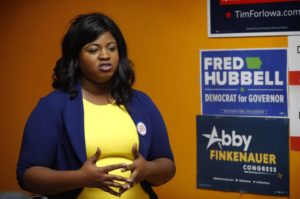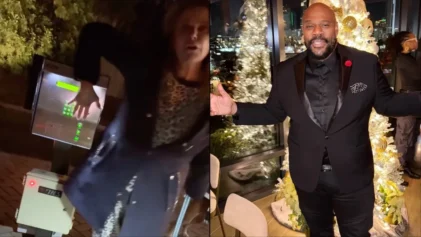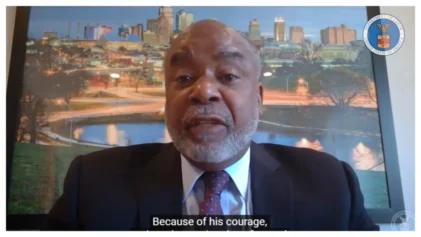
Iowa Democratic candidate for secretary of state Deidre DeJear talks to local residents during a campaign stop in Osage, Iowa. (AP Photo/Charlie Neibergall)
CLEAR LAKE, Iowa (AP) — Deidre DeJear is Iowa’s newest political star — even if she hasn’t yet won an election.
Sen. Cory Booker of New Jersey, who is considering a bid for the Democratic presidential nomination, recently made his inaugural trip to Iowa by headlining a fundraiser for DeJear. Sen. Bernie Sanders of Vermont, who is considering a second White House run, will stump with DeJear on Sunday. And Sen. Kamala Harris of California, another White House prospect, will make her Iowa debut Monday alongside DeJear.
Prospective presidential candidates often curry favor with local politicians in the state that holds the nation’s first caucus. But even by Iowa standards, this is a lot of high-wattage attention being paid to a 32-year-old who has not won her campaign for secretary of state, typically a low-profile position focused on overseeing elections.
The spotlight reflects the excitement surrounding the woman who is the first African American to win a primary for statewide office in vastly white Iowa. And she is perhaps the best example of the importance Democrats around the country are placing on the role of secretary of state at a time when voting rules are being steadily tightened in states under Republican leadership.
“Any time that they choose to use their spotlight to talk about a little ‘ol secretary of state’s race does wonders for our state and this race,” DeJear said in a recent interview. “We want to ensure people are voting for a secretary of state that will ensure equal access to the ballot box.”
Other Democratic women of color — notably Stacey Abrams, the candidate for governor in Georgia — have captured the national spotlight during this dynamic midterm campaign year. But there is an unmistakable element of political geography fueling DeJear’s rise as Democrats considering launching presidential campaigns have helped make her one of the best-financed candidates for secretary of state in the nation this year.
DeJear, who was among the first round of candidates former President Barack Obama endorsed in August, has raised more than $605,000 as of the end of September. In 2014, incumbent Republican Secretary of State Paul Pate, who is seeking re-election, raised $242,000 during his entire campaign.
Despite the national attention, DeJear is remaining focused on local politics. She recently took a road trip across sparsely populated northern Iowa, visiting rural counties well north of the Democratic bastion of Des Moines.
It was a long way from Jackson, Mississippi, where DeJear was born and caught the political bug from her grandmother, Mattie Washington. The larger-than-life daughter of a share-cropper became a Democratic leader and county election commissioner in Yazoo County, Mississippi, after leaving the farm to attend school.
“I did volunteer for her race, but she did not pay me as well,” DeJear recalled with a smile. “But she’s 6’ 5″ and 220, and no one says ‘no’ to her.”
Two generations later, DeJear too charted a new course, choosing Iowa to attend Drake University in Des Moines, after her family moved with her father’s job to Oklahoma. DeJear would later work on Obama’s winning campaign for the 2008 Iowa caucuses, providing a first bite at rallying voters and a first taste of rural Iowa.
Ten years later, DeJear capped a day on her own campaign, meeting with Democratic and business leaders — and making plenty of fundraising calls. She spoke with 50 party activists, all white and most of them older than her, in a Main Street storefront in tiny Northwood. The farming town of 2,000 is the most populous in Worth County, where Obama won in 2008 and 2012, but which Trump carried in 2016.
“This, this thing that we call voting, it’s the fundamental aspect of what our country is about,” DeJear told the group. “You need an active secretary of state that’s going to ensure that people are participating.”
DeJear is a vocal critic of a law signed in 2017 that requires voters to show identification, eliminated a straight-party ballot option and removed thousands of inactive voters from state registration rolls.
Pate championed the bill, enacted by a GOP-controlled statehouse last year, and is seeking a second term arguing the law was needed to maintain the integrity of voting in Iowa, despite scant evidence of voter fraud in the state. The changes disproportionately affect Democratic-leaning parts of the Iowa electorate, including racial minorities.
“Voter ID is already working,” Iowa Republican Party spokesman Jesse Dougherty said, responding for Pate’s campaign. “The majority of Iowans support it, and it’s now easier to vote and harder to cheat.”
After voter ID laws moved forward in GOP-led states in the mid-2000s, the pace accelerated after the 2010 elections, when Republicans swept into Capitols across the upper Midwest. Iowa followed after the 2016 election, when Republicans achieved control of the statehouse.
DeJear represents a trend this year in battleground states, where younger, emerging candidates advocating expanded voting rights are running for their states’ top election post. Such candidates are on the ballot in Michigan, Ohio and Arizona, where Trump won in 2016, and Colorado and Nevada, where he lost but was competitive. Even in reliably Republican Georgia, where Democrats have flirted with competing in recent presidential elections, moderate Democrat John Barrow tells voters that ballot access, not just election security, is a necessary part of free and fair elections.
But DeJear has sparked something unusual.
At the Iowa Democratic Party’s recent fall fundraising gala, where the parade of statewide and congressional candidates were introduced, DeJear prompted wild cheers, more raucous than for her rivals. Later during the event, DeJear’s cobalt blue dress enhanced the contrast she presented standing alongside her four fellow down-ballot candidates, all white men in dark suits.
But it’s not a new experience for DeJear, who was among the only black students at her elementary and high schools in Oklahoma. “When I came to Iowa, it was less about culture shock and more about weather shock,” she said. “I’m a Southerner.”
The combination is refreshing, especially to older white voters who were moved by Obama in 2008.
“Oh God. She’s a real, go-getter, and seems to understand how to bring people together,” said Edith Haenel, a retired social worker.


